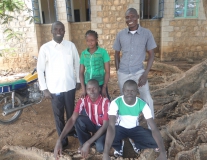- About
- Topics
- Picks
- Audio
- Story
- In-Depth
- Opinion
- News
- Donate
- Signup for our newsletterOur Editors' Best Picks.Send
Read, Debate: Engage.
| December 09, 2016 | |
|---|---|
| topic: | Peace and Reconciliation |
| tags: | #citizenship, #football, #nationality, #South Sudan, #Sudan |
| located: | South Sudan, Sudan |
| by: | Hassan Faroog |
This story was originally published on The Niles.
Al-Amir sharply criticised politicians, dubbing secession a politicians’ game which he did not want any part of. He added that the southerner Richard Justin, a defensive midfielder, would continue to be his close friend and brother, regardless of politicians’ wrangling.
But five years after he uttered those words, a lot of water has passed under the bridge. A number of Sudanese football clubs continued to label South Sudanese players as national team members, refusing to change their ID to give them a ‘foreigner’ status. They relied on pre-separation legal provisions as a loophole to allow them to contract South Sudanese players as nationals. This is how South Sudanese football players were the last to be subjected to the citizenship laws.
By the end of the contracting period, footballers from the south had been deprived of Sudanese citizenship. But because sports clubs in Sudan have a particular arrangement with politics, they try to maintain their players’ citizenship through naturalisation, rather than reporting them as foreign players.
Al-Hilal Club managed to grant its player Atir Thomas Sudanese nationality through naturalisation, making him the first South Sudanese citizen, not just football player, to become Sudanese after separation.
This illustrated the special role of the sports sector: Officials have repeatedly claimed that the naturalisation process is too difficult for South Sudanese to undertake.
Jum’a Genaro, the goalkeeper of al-Hilal Club, faced a daunting prospect when his contract expired. His club wanted to extend his time at the team, but because he was now considered a “foreign player” rather than “national player”, he was unable to continue.
By claiming that Genaro comes from the Abyei area, which is claimed by South Sudan and Sudan, al-Hilal then tried to sidestep the problem. However, the Sudan Football Association (SFA) rejected this after it found out that he does not hail from the region. Finally, the al-Hilal Club resorted to the naturalisation option. Genaro was registered in Cooper Club team, a first-class club and he was then seconded to al-Hilal.
But the team was not unusual in trying to play the Abyei card to secure its player’s future. For five years now, the border territory of Abyei has been fiercely disputed by the two countries. A number of Sudanese clubs have sought to recruit players from South Sudan using the provisions of the SFA bylaws, which consider Abyei players as nationals.
A great many players have already been recruited via this legal loophole, but recently there has been an influx of complaints that some of those players come from elsewhere in South Sudan. Amid the recent furor, the SFA faced tough questions about the registration of al-Hilal Kadougli player Tong Touk and the al-Merreikh player Alok Akij.
This back and forth has overshadowed the season. The SFA has now blocked the participation of those registered as belonging to Abyei, unless they have a national ID number confirming their origins.
That SFA decision has affected both contracted and new South Sudanese players. The biggest loser was al-Merreikh Sporting Club which saw four of its players blocked from participation: Wall Luak, Aguer Joseph, Zacharia Nacio, and goalkeeper Elias who moved to South Sudan after his difficulties in the north.
And today, only a handful remain. Mo’men Watar, is registered as a foreign player, Dominik Aboy still plays for the Khartoum National Team and Watak Lual is part of the al-Ahly Shendi squad. All three still manage to play despite their “foreign player” label.
But the future remains uncertain for many. Tong Tok, a al-Hilal Kadougli player, and Alok Akij, who has moved to al-Merreikh, have been excluded from the pitch.
Over the past five years, a number of high- profile players have returned to South Sudan to join southern clubs. Among them was Richard Justin, who played for the national team before separation, as well as playing for al-Hilal, al-Merreikh and Khartoum National Team. He is now on the al-Nasser team.
Dida, former goalkeeper of the al-Nusoor team also returned to Malakia and Katour. The famous player James Joseph who played for the national team, as well as al-Hilal and al Merreikh, has moved on to play in India.
Jimmy Natalie, a former al-Merreikh player is now on the squad of al-Hilal Juba. Khamis Martin, another ex al-Merreikh player is now signed up by Itlaa Barra. Jimmy Mandela played for Momote team after returning home and now he has now moved to Egypt.
By copying the embed code below, you agree to adhere to our republishing guidelines.

